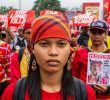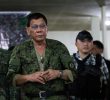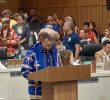MARAWI CITY, Philippines – Moro leaders in Marawi City warn the government of a possible worse scenario if the promised rehabilitation fails to cater to people’s interests.
In an interview with Davao Today, Sultan of Marawi, Hamidullah Atar says his people are getting impatient as they ‘remained puzzled and clueless’ on the government’s rehabilitation plan in Marawi after a five-month-long war between government troops and ISIS-inspired group – Maute group.
The Sultan of Marawi emphasized the importance of involving the residents to government’s rehabilitation plan saying, Meranaw culture and religion must be one of the biggest consideration for the planned rehabilitation. He added that there should be a blueprint of the planned rebuilding and rehabilitation of Marawi and the government must see to it that the people are involved and consulted in the process.
“The people should be consulted and also be part from the debris assessment, to planning, to rehabilitation, to monitoring. This government should share to us their hidden agenda so that we can comment on how it can be done while considering meranaw’s culture and beliefs” said Sultan Atar.
In the governments overall project design for the Marawi rehabilitation that was unveiled in May this year, the plan showed new public spaces such as parks, gleaming still and mall glass, plazas, and streets, as well as a two-hectare historical site for museum that will feature war memorabilia to be implemented in three to five years before President Rodrigo Duterte ends his term.
Another part of the presented rehabilitation plan is the installation of military camps and housing for military personnel located in ground zero.
A five-year and reconstruction of the devastated city of Marawi cost P62-billion budget. But the total budget allotted for Marawi rehabilitation in the General Appropriations Act of the government this year is only around P10Billion.
Finance Secretary Carlos Dominguez III said rehabilitation budget would cover the use of heavy equipment and the plan by the government to acquire certain properties in the area, hence the need to explore ways on how to finance the additional P52 billion.
With the projection of fund needed, Dominguez added that certain portions of the money will come from grants where the countries of Japan, China and the United Stated States have committed to aiding the Marawi rehabilitation.
Hope for BOL
With the ratification of the Bangsamoro Organic Law (BOL), the Sultan told Davao Today that the people of Marawi on the ground have a lot of expectation with the proposed new bangsamoro governance.
He added that the BOL gives the people high hopes in bringing the needed rehabilitation and healing of the ravaged city.
In the 10 point agenda of the BOL which the Marawi rehabilitation has been included, Atar said that the people believed that the only solution to all the problems in Marawi is the BOL “making it more challenging in the next coming months after the plebiscite”.
However, Atar also added that the BOL “does not refer to independence” since still, it needs some supervision from the national government in its implementation including the city’s rehabilitation.
“The plan they intended to implement in our city is way more different to what the Marawi people want to happen. The fact that those who composed the Task Force Bangon Marawi are not civilians, it only shows to whose interests will push through” Atar said.
Atar clarifies to Davao Today that the BOL is not a perfect a law it will face greater challenges along the way, as the growing numbers of meranaws are impatient.
Use of arms
Atar worries that if the rehabilitation is not culturally sensitive and will prioritized economic development contradict to what the people want; it will just fuel the sentiment of the impatient meranaws and may lead to the use of arms.
Another Moro leader, Aga Khan Sharieff told Davao Today in an interview that the Meranaws have long been enduring the sacrifice since the beginning of the war but “would take up arms if the government will not allow them to return home.”
“They are not asking us for a little patience, they are asking us for higher patience yet they kept on delaying the rehabilitation. That made us angry. If they can’t rehabilitate our city, just let us do the work” said Sharieff.
One Moro commander in the area, who asked to hide his identity, said they are just observing the moves of the authorities on the ground as they too are victims of war. In an interview, he told Davao today that most of his members were impatient as they see are just turtle phasing effort of the administration in the rehabilitation.
This sentiment he said is natural. But they are still hopeful for what awaits them with the BOL agenda.
The BOL is largely anchored on the Comprehensive Agreement on the Bangsamoro — a peace agreement between the government and the Moro Islamic Liberation Front (MILF) which under the normalization process, it envisions conflict-affected communities to return to conditions where they can achieve their desired quality of life, which includes the pursuit of sustainable livelihoods and political participation within a peaceful deliberate society.
Hence, Atar said, the government should recognize the opposition of the meranaw people in its plan to put up military camps and other big infrastructures.(davaotoday.com)









